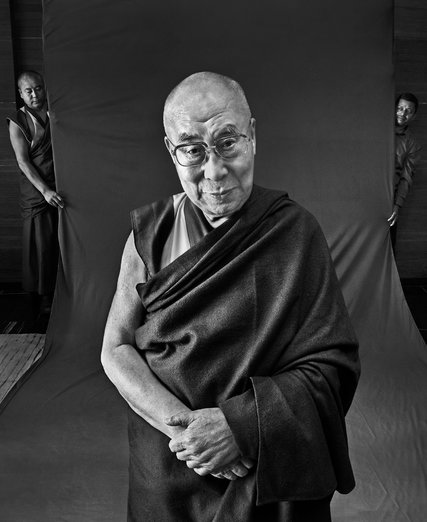
On a wet Sunday in June at the Glastonbury Festival, more than 100,000 people spontaneously burst into a rendition of ‘‘Happy Birthday.’’ Onstage, Tenzin Gyatso, the 14th Dalai Lama, blew out the solitary candle on a large birthday cake while clasping the hand of Patti Smith, who stood beside him. The world’s most famous monk then poked a thick finger at Smith’s silvery mane. ‘‘Musicians,’’ he said, ‘‘white hair.’’ But ‘‘the voice and physical action,’’ he added in his booming baritone, ‘‘forceful.’’ As Smith giggled, he went on: ‘‘So, that gives me encouragement. Myself, now 80 years old, but I should be like you — more active!’’
The crowd, accustomed to titanic vanity from its icons — Kanye West declared himself the ‘‘greatest living rock star on the planet’’ the previous night — looked uncertain before erupting with cheers and claps. The Dalai Lama then walked into the throng of celebrities wandering about backstage, limping slightly; he has a bad knee. He looked as amused and quizzical as ever in his tinted glasses when Lionel Richie approached and, bowing, said, ‘‘How are you?’’ ‘‘Good, good,’’ he replied, clasping Richie’s hands.
When the Dalai Lama entered his dressing room, I stood up hurriedly, as did the Tibetan monk who was sitting beside me. ‘‘Sit, sit,’’ he said and then noticed a black-and-white photo of naked young men and women dancing during Glastonbury’s earliest days. He turned to me with a mischievous smile, and said, ‘‘Please sit and enjoy the photo.’’ He then spoke in rapid-fire Tibetan to the monk, cackling with delight: ‘‘These pleasures,’’ he said, ‘‘are not for us.’’
And yet here he was in his crimson robes — ‘‘just a simple Buddhist monk,’’ as he describes himself — among Britain’s extravagantly costumed young revelers in a 900-acre bacchanal in the muddy heart of the English countryside, inconceivably remote from the mountain passes, high plateau and rolling grasslands of his Tibetan homeland. For much of his 80 years, the Dalai Lama has been present at these strange intersections of religion, entertainment and geopolitics. In old photos, you can see the 9-year-old who’d received the gift of a Patek Phillipe watch from President Franklin Delano Roosevelt. Another twist of the kaleidoscope reveals him tugging at Russell Brand’s shaggy beard, heartily laughing with George W. Bush in the White House or exhorting you to ‘‘Think Different’’ in an advertisement for Apple.
Though the Dalai Lama has yet to use a computer, the 1990s ‘‘Think Different’’ ad is a reminder that he was a mascot of globalization in its early phase, between the fall of the Berlin Wall in 1989 and the terrorist attacks of 9/11. In that innocent era, the universal triumph of liberal capitalism and democracy seemed assured, as new nation-states appeared across Europe and Asia, the European Union came into being, apartheid in South Africa ended and peace was declared in Northern Ireland. It could only be a matter of time before Tibet, too, was free.
The Dalai Lama still travels energetically around the world while frequently joking about his age (‘‘Time to say, ‘Bye-bye!’ ’’). His Twitter, Facebook and Instagram accounts help secure his place in the contemporary whirl. But the cause of Tibet, once eagerly embraced by politicians as well as entertainers, has been eclipsed in the post-9/11 years. The world has become more interconnected, but — defined by spiraling wars, frequent terrorist attacks and the rapid rise of China — it provokes more anxiety and bewilderment than hope. The Dalai Lama himself has watched helplessly from his residence in Dharamsala, a scruffy Indian town in the Himalayan foothills, as his country, already despoiled by Mao’s Cultural Revolution, is coerced into an equally breakneck modernization program directed from Beijing.
The economic potency of China has made the Dalai Lama a political liability for an increasing number of world leaders, who now shy away from him for fear of inviting China’s wrath. Even Pope Francis, the boldest pontiff in decades, reportedly declined a meeting in Rome last December. When the Dalai Lama dies, it is not at all clear what will happen to the six million Tibetans in China. The Chinese Communist Party, though officially atheistic, will take charge of finding an incarnation of the present Dalai Lama. Indoctrinated and controlled by the Communist Party, the next leader of the Tibetan community….
Keep reading: Click here




